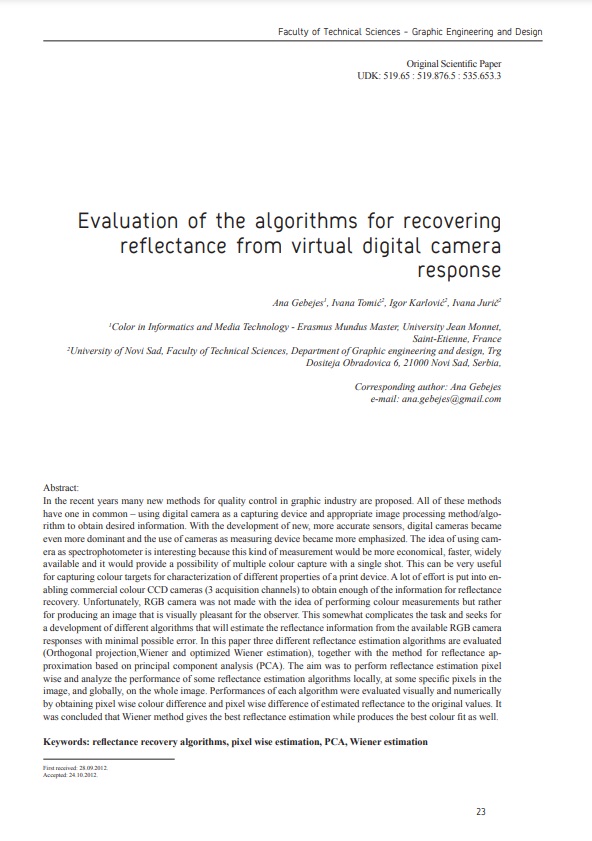Evaluation of the algorithms for recovering reflectance from virtual digital camera response

Published 2023-10-01
abstract views: 190 // Full text article (PDF): 184
Keywords
- reflectance recovery algorithms,
- pixel wise estimation,
- PCA,
- Wiener estimation
How to Cite
Copyright (c) 2012 © 2012 Authors. Published by the University of Novi Sad, Faculty of Technical Sciences, Department of Graphic Engineering and Design. This article is an open access article distributed under the terms and conditions of the Creative Commons Attribution license 3.0 Serbia.

This work is licensed under a Creative Commons Attribution 3.0 Unported License.
Abstract
-
have one in common – using digital camera as a capturing device and appropriate image processing method/algorithm to obtain desired information. With the development of new, more accurate sensors, digital cameras became even more dominant and the use of cameras as measuring device became more emphasized. The idea of using camera as spectrophotometer is interesting because this kind of measurement would be more economical, faster, widely available and it would provide a possibility of multiple colour capture with a single shot. This can be very useful for capturing colour targets for characterization of different properties of a print device. A lot of effort is put into enabling commercial colour CCD cameras (3 acquisition channels) to obtain enough of the information for reflectance recovery. Unfortunately, RGB camera was not made with the idea of performing colour measurements but rather for producing an image that is visually pleasant for the observer. This somewhat complicates the task and seeks for a development of different algorithms that will estimate the reflectance information from the available RGB camera responses with minimal possible error. In this paper three different reflectance estimation algorithms are evaluated (Orthogonal projection,Wiener and optimized Wiener estimation), together with the method for reflectance approximation based on principal component analysis (PCA). The aim was to perform reflectance estimation pixel wise and analyze the performance of some reflectance estimation algorithms locally, at some specific pixels in the image, and globally, on the whole image. Performances of each algorithm were evaluated visually and numerically by obtaining pixel wise colour difference and pixel wise difference of estimated reflectance to the original values. It was concluded that Wiener method gives the best reflectance estimation while produces the best colour fit as well.

